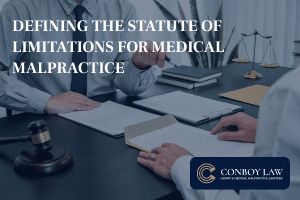
Gaining insight about the statute of limitations for medical malpractice in Illinois is crucial for anyone considering a lawsuit. This law sets the time frame within which you must file your claim. It’s designed to ensure fairness and timeliness in the legal process. Failing to file within this period could mean losing your right to seek justice.
The Illinois medical malpractice statute of limitations can be complex. Different factors, such as the date of the alleged malpractice or the victim’s age, can affect this timeframe. It’s essential to get accurate information about these deadlines to avoid missing your opportunity for a lawsuit. Consulting with a knowledgeable medical malpractice lawyer is the best way to understand these time limits. At Conboy Law, we have experience with medical malpractice lawsuits and medical malpractice claims.
Learn more about the timeline of Illinois medical malpractice cases below. Then, contact us to schedule a free consultation.
Illinois law defines medical malpractice as a healthcare professional’s neglect to provide the standard of care, resulting in harm to a patient. This can include diagnosis, treatment, aftercare, or health management errors. Filing a medical malpractice lawsuit requires proving that this negligence directly caused your injury or worsened your condition.
Illinois medical malpractice laws aim to protect patients while preventing frivolous claims. They require specific evidence and expert testimony to establish a valid case. Understanding these laws is crucial for anyone thinking of filing a medical malpractice claim. They set the guidelines for what constitutes medical malpractice and how to pursue legal action.

The statute of limitations for medical malpractice cases in Illinois is typically two years. This means you have to file a lawsuit before two years from the date you knew or reasonably should have known about the injury. However, the law also states that no claim can be filed more than four years after the date of the alleged malpractice, regardless of when you discovered the injury, including a burn injury.
Certain circumstances can alter the standard statute of limitations in medical malpractice cases. These are governed by Illinois medical malpractice laws.
The statute of limitations for minors is different. If the victim was under 18 at the time of the alleged malpractice, they have until their 22nd birthday to file a lawsuit, but no more than eight years from the date of the alleged malpractice. This extension recognizes that minors may need additional time to discover and understand the harm resulting from medical negligence, such as a birth injury or cerebral palsy.
Parents or guardians can submit a claim for a minor. However, it’s crucial to act promptly. Waiting until the child turns 18 may limit the time available to file a lawsuit. Legal guidance is essential in these cases to ensure compliance with the specific deadlines.
The discovery rule can prolong the statute of limitations in certain situations. If you couldn’t have reasonably discovered the injury right away, the clock starts when you do discover it or should have discovered it. This rule acknowledges that some injuries or effects of malpractice aren’t immediately apparent.
However, the discovery rule doesn’t extend the ultimate four-year limit from the date of the alleged malpractice. This means even if you discover the injury later, you must file within four years of the medical incident. Legal advice is crucial to navigate these nuances and determine the exact deadline for your case.
Tolling refers to the pausing or delaying of the statute of limitations in specific situations. For instance, if the medical professional leaves the state after committing the alleged malpractice, the clock may stop until they return. This ensures that defendants can’t evade lawsuits by moving away.
Other circumstances, like the plaintiff’s mental incapacity, can also toll the statute. In such cases, the limitations period might be extended until the disability is removed. Each situation is unique, and a medical malpractice attorney can help clarify how these rules apply to your case.
Calculating the deadline for a medical malpractice lawsuit requires understanding the specific dates of your case. You need to determine the date of the alleged malpractice and the date you discovered or should have discovered the injury. Add the statutory period to these dates to find your deadline.
However, calculating this deadline can be complex, especially if exceptions apply. A medical malpractice attorney can aid you in determining the exact date by which you must file your claim. They will consider all relevant factors, including any applicable exceptions, to ensure you meet the legal requirements.

Missing the filing deadline for a medical malpractice claim has serious consequences. Generally, if you file after the statute of limitations has expired, it will result in the court dismissing your case. This means you lose the opportunity to seek compensation for your injuries, no matter how severe they are.
It’s crucial to act quickly and pursue legal advice as soon as you suspect medical malpractice. A skilled attorney will ensure your claim is submitted on time and protect your rights. They understand the urgency and will work diligently to meet all legal deadlines.
Several legal doctrines can impact the statute of limitations in medical malpractice cases.
The doctrine of laches might apply if there’s an unreasonable delay in filing a lawsuit that disadvantages the defendant. This doctrine is based on fairness – it prevents plaintiffs from waiting an excessively long time to sue, during which evidence might be lost or memories might fade.
However, laches is different from the statute of limitations. It’s based on the specific circumstances of the case, not a set time limit. Your lawyer can advise you on whether laches might be a factor in your case and how to avoid it affecting your lawsuit.
Estoppel could prevent a defendant from asserting the statute of limitations as a defense if their actions misled the plaintiff. For example, if a healthcare professional promised to fix a problem caused by their negligence, you might have waited to file a lawsuit based on that promise.
Estoppel is a complex legal concept. It requires proof that the defendant’s actions or statements caused you to delay filing your claim. Legal expertise is vital to argue estoppel effectively in a medical malpractice case.
The relation back doctrine allows certain amendments to a lawsuit to be considered as part of the original filing. This means if you need to add a claim or party to your lawsuit, it might not be barred by the statute of limitations if it relates back to the original filing.
This doctrine is particularly useful in complex medical malpractice cases, where new information might emerge after the initial filing. However, its application is specific and requires a legal understanding of how it works in Illinois law.

Navigating the exceptions and potential extensions to the statute of limitations in medical malpractice cases requires a deep understanding of Illinois law. Each case has unique elements that might affect the deadline. It’s important to consult with a lawyer to explore all possible exceptions and extensions that could apply to your case.
However, relying on exceptions is risky. The best approach is to act quickly and file your lawsuit well within the standard limitations period. This ensures your case proceeds without the risk of being dismissed for being filed too late.
Preparing for a medical malpractice lawsuit involves gathering evidence, such as medical records, and consulting with experts. You need to build a strong case to prove that the healthcare professional’s actions constituted medical malpractice. This preparation should start as soon as possible to ensure everything is ready before the statute of limitations expires.
In addition, preparation involves understanding the legal process and what to expect. A medical malpractice lawyer can shepherd you through this process, ensuring you are well-prepared for each step.

If you believe you have experienced medical malpractice, you need to reach out to us as soon as possible. Conboy Law is here to assist you with your medical malpractice lawsuit in Illinois. Our experienced attorneys understand the intricacies of Illinois medical malpractice laws and will work tirelessly to help you seek justice.
We leverage customized legal strategies that match the details of your specific case. Our team is committed to guiding you on your journey to justice. We have a long track record of case results that prove it. Contact us today for a consultation.
If you or a loved one has been injured, don’t hesitate to contact our injury attorneys today!
"*" indicates required fields


